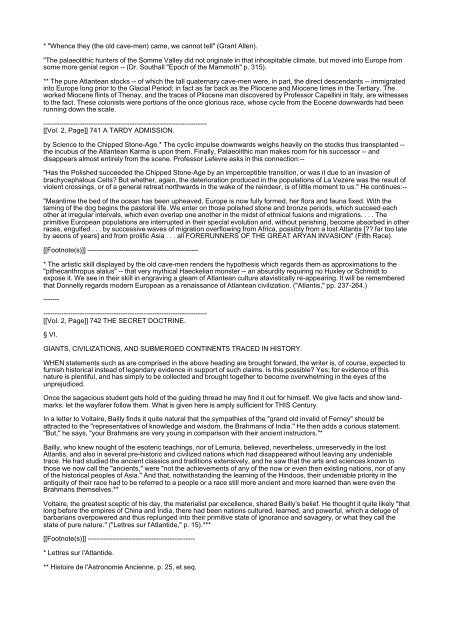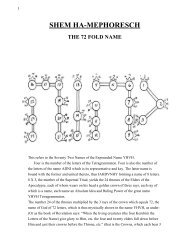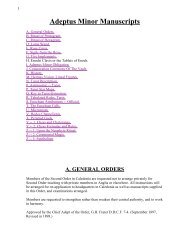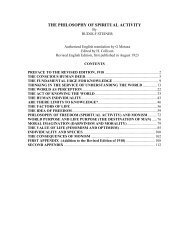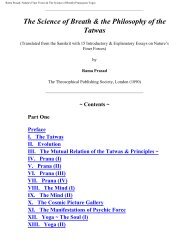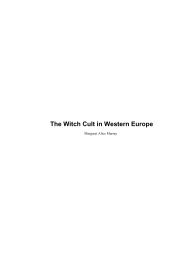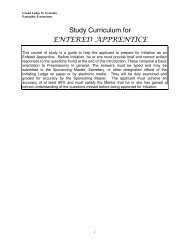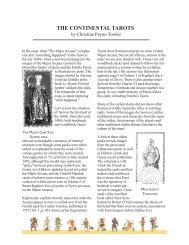Band 2 Anthropogenesis - H.P. Blavatsky
Band 2 Anthropogenesis - H.P. Blavatsky
Band 2 Anthropogenesis - H.P. Blavatsky
You also want an ePaper? Increase the reach of your titles
YUMPU automatically turns print PDFs into web optimized ePapers that Google loves.
* "Whence they (the old cave-men) came, we cannot tell" (Grant Allen).<br />
"The palaeolithic hunters of the Somme Valley did not originate in that inhospitable climate, but moved into Europe from<br />
some more genial region -- (Dr. Southall "Epoch of the Mammoth" p. 315).<br />
** The pure Atlantean stocks -- of which the tall quaternary cave-men were, in part, the direct descendants -- immigrated<br />
into Europe long prior to the Glacial Period; in fact as far back as the Pliocene and Miocene times in the Tertiary. The<br />
worked Miocene flints of Thenay, and the traces of Pliocene man discovered by Professor Capellini in Italy, are witnesses<br />
to the fact. These colonists were portions of the once glorious race, whose cycle from the Eocene downwards had been<br />
running down the scale.<br />
------------------------------------------------------------------------<br />
[[Vol. 2, Page]] 741 A TARDY ADMISSION.<br />
by Science to the Chipped Stone-Age.* The cyclic impulse downwards weighs heavily on the stocks thus transplanted --<br />
the incubus of the Atlantean Karma is upon them. Finally, Palaeolithic man makes room for his successor -- and<br />
disappears almost entirely from the scene. Professor Lefevre asks in this connection:--<br />
"Has the Polished succeeded the Chipped Stone-Age by an imperceptible transition, or was it due to an invasion of<br />
brachycephalous Celts? But whether, again, the deterioration produced in the populations of La Vezere was the result of<br />
violent crossings, or of a general retreat northwards in the wake of the reindeer, is of little moment to us." He continues:--<br />
"Meantime the bed of the ocean has been upheaved, Europe is now fully formed, her flora and fauna fixed. With the<br />
taming of the dog begins the pastoral life. We enter on those polished stone and bronze periods, which succeed each<br />
other at irregular intervals, which even overlap one another in the midst of ethnical fusions and migrations. . . . The<br />
primitive European populations are interrupted in their special evolution and, without perishing, become absorbed in other<br />
races, engulfed . . . by successive waves of migration overflowing from Africa, possibly from a lost Atlantis [?? far too late<br />
by aeons of years] and from prolific Asia . . . all FORERUNNERS OF THE GREAT ARYAN INVASION" (Fifth Race).<br />
[[Footnote(s)]] -------------------------------------------------<br />
* The artistic skill displayed by the old cave-men renders the hypothesis which regards them as approximations to the<br />
"pithecanthropus alalus" -- that very mythical Haeckelian monster -- an absurdity requiring no Huxley or Schmidt to<br />
expose it. We see in their skill in engraving a gleam of Atlantean culture atavistically re-appearing. It will be remembered<br />
that Donnelly regards modern European as a renaissance of Atlantean civilization. ("Atlantis," pp. 237-264.)<br />
-------<br />
------------------------------------------------------------------------<br />
[[Vol. 2, Page]] 742 THE SECRET DOCTRINE.<br />
§ VI.<br />
GIANTS, CIVILIZATIONS, AND SUBMERGED CONTINENTS TRACED IN HISTORY.<br />
WHEN statements such as are comprised in the above heading are brought forward, the writer is, of course, expected to<br />
furnish historical instead of legendary evidence in support of such claims. Is this possible? Yes; for evidence of this<br />
nature is plentiful, and has simply to be collected and brought together to become overwhelming in the eyes of the<br />
unprejudiced.<br />
Once the sagacious student gets hold of the guiding thread he may find it out for himself. We give facts and show landmarks:<br />
let the wayfarer follow them. What is given here is amply sufficient for THIS Century.<br />
In a letter to Voltaire, Bailly finds it quite natural that the sympathies of the "grand old invalid of Ferney" should be<br />
attracted to the "representatives of knowledge and wisdom, the Brahmans of India." He then adds a curious statement.<br />
"But," he says, "your Brahmans are very young in comparison with their ancient instructors."*<br />
Bailly, who knew nought of the esoteric teachings, nor of Lemuria, believed, nevertheless, unreservedly in the lost<br />
Atlantis, and also in several pre-historic and civilized nations which had disappeared without leaving any undeniable<br />
trace. He had studied the ancient classics and traditions extensively, and he saw that the arts and sciences known to<br />
those we now call the "ancients," were "not the achievements of any of the now or even then existing nations, nor of any<br />
of the historical peoples of Asia." And that, notwithstanding the learning of the Hindoos, their undeniable priority in the<br />
antiquity of their race had to be referred to a people or a race still more ancient and more learned than were even the<br />
Brahmans themselves.**<br />
Voltaire, the greatest sceptic of his day, the materialist par excellence, shared Bailly's belief. He thought it quite likely "that<br />
long before the empires of China and India, there had been nations cultured, learned, and powerful, which a deluge of<br />
barbarians overpowered and thus replunged into their primitive state of ignorance and savagery, or what they call the<br />
state of pure nature." ("Lettres sur l'Atlantide," p. 15).***<br />
[[Footnote(s)]] -----------------------------------------------<br />
* Lettres sur l'Atlantide.<br />
** Histoire de l'Astronomie Ancienne, p. 25, et seq.


